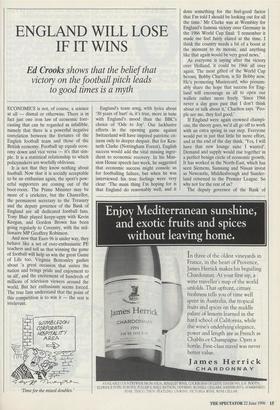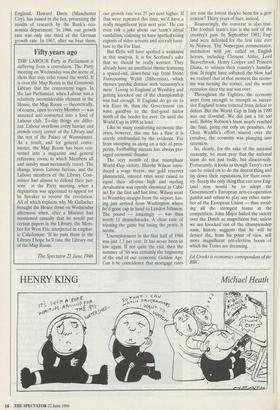ENGLAND WILL LOSE IF IT WINS
Ed Crooks shows that the belief that
victory on the football pitch leads to good times is a myth
ECONOMICS is not, of course, a science at all — dismal or otherwise. There is in fact just one iron law of economic fore- casting that can be regarded as infallible, namely that there is a powerful negative correlation between the fortunes of the English football team and those of the British economy. Football up equals econ- omy down and vice versa — it's that sim- ple. It is a statistical relationship to which policymakers are woefully oblivious.
It is not that they know nothing about football. Now that it is socially acceptable to be an enthusiast again, the sport's pow- erful supporters are coming out of the boot-room. The Prime Minister may be more of a cricketer„ but the Chancellor, the permanent secretary to the Treasury and the deputy governor of the Bank of England are all dedicated football fans. Tony Blair played keepy-uppy with Kevin Keegan, and Gordon Brown has been going regularly to Coventry, with the mil- lionaire MP Geoffrey Robinson.
And now that Euro 96 is under way, they behave like a set of over-enthusiastic PE teachers and tell us that winning the game of football will help us win the great Game of Life too. Virginia Bottomley gushes about 'a great occasion that unites the nation and brings pride and enjoyment to us all', and the excitement of hundreds of millions of television viewers around the world. But her enthusiasm seems forced. The true fans understand that the point of this competition is to win it — the rest is irrelevant.
`Time for the mixed doubles.'
England's team song, with lyrics about `30 years of hurt' is, it's true, more in tune with England's mood than the BBC's choice of 'Ode to Joy'. Our lacklustre efforts in the opening game against Switzerland will have inspired patriotic cit- izens only to deeper despair. But for Ken- neth Clarke (Nottingham Forest), English success would add the vital missing ingre- dient to economic recovery. In his Man- sion House speech last week, he suggested that economic success might console us for footballing failure, but when he was interviewed his true feelings were very clear: 'The main thing I'm hoping for is that England do reasonably well, and it does something for the feel-good factor that I'm told I should be looking out for all the time.' Mr Clarke was at Wembley for England's famous victory over Germany in the 1966 World Cup final: 'I remember it made me feel fairly elated at the time. I think the country needs a bit of a boost at the moment to its morale, and anything like that again would be very good news.'
As everyone is saying after the victory over Holland, it could be 1966 all over again. The most gifted of the World Cup heroes, Bobby Charlton, is Sir Bobby now. He's promoting Mastercard, who presum- ably share the hope that success for Eng- land will encourage us all to open our wallets rather more freely. 'Since 1966 never a day goes past that I don't think about or talk about it,' Charlton says. 'Peo- ple see me, they feel good.'
If England were again crowned champi- ons, the theory goes, we'd all go off to work with an extra spring in our step. Everyone would put in just that little bit more effort, and at the end of the day think, 'Yes, I will have that new lounge suite I wanted'. Demand and supply would rise together in a perfect benign circle of economic growth. It has worked in the North-East, which has seen Siemens, Samsung and Nissan invest as Newcastle, Middlesbrough and Sunder- land returned to the Premier League. So why not for the rest of us?
The deputy governor of the Bank of England, Howard Davis (Manchester City), has joined in the fun, presenting the results of research by the Bank's eco- nomics department: 'In 1966, our growth rate was only one third of the German growth rate. In 1967, after we beat them, our growth rate was 25 per cent higher. If that were repeated this time, we'd have a really magnificent year next year.' He can even risk a joke about our team's aerial vandalism, claiming to have spotted rising exports of video screens and aircraft furni- ture to the Far East.
But Celts will have spotted a weakness in this analysis. It is for Scotland's sake that we should be really worried. They already have an unofficial theme featuring a spaced-out, down-beat rap from Irvine Trainspotting Welsh (Hibernian), which rhymes 'psychic distress' with 'economy's a mess'. Losing to England at Wembley and getting knocked out of the championship was bad enough. If England do go on to win Euro 96, then the Government can wave goodbye to the feel-good factor north of the border for ever. Or until the World Cup in 1998 at least.
Like so many comforting economic the- ories, however, this one has a flaw: it is utterly confounded by the evidence. Far from sweeping us along on a tide of pros- perity, footballing success has always pre- saged economic disaster.
The very month of that triumphant World Cup victory, Harold Wilson intro- duced a wage freeze, our gold reserves plummeted, interest rates were raised to equal their all-time high and sterling devaluation was openly discussed in Cabi- net for the first and last time. Wilson went to Wembley straight from the airport, hav- ing just arrived from Washington where he'd gone cap in hand to Lyndon Johnson. The pound — amazingly — was then worth 11 deutschmarks. A clear case of winning the game but losing the peace, it seems.
Unemployment in the first half of 1966 was just 1.3 per cent. It has never been so low again. If not quite the end, then the summer of '66 was certainly the beginning of the end of our economic Golden Age. Can it be coincidence that mortgage rates are now the lowest they've been for a gen- eration? Thirty years of hurt, indeed.
Reassuringly, the converse is also true. The football team's loss is the rest of the country's gain. In September 1981, Eng- land were defeated for the first time ever by Norway. The Norwegian commentator, incoherent with joy, called on English heroes, including Clement Attlee, Lord Beaverbrook, Henry Cooper and Princess Diana, to witness their country's humilia- tion. It might have softened the blow had we realised that at that moment the econo- my was turning the corner, and the worst recession since the war was over.
Throughout the Eighties, the economy went from strength to strength as succes- sive England teams tottered from defeat to defeat. But the World Cup in Italy in 1990 was our downfall. We did just a bit too well. Bobby Robson's team nearly reached the final, going out only on penalties. As Chris Waddle's effort soared over the crossbar, the economy was plunging into recession.
So, clearly, for the sake of the national economy, we must pray that the national team do not just badly, but disastrously. Fortunately, it looks as though Terry's crew can be relied on to do the decent thing and lay down their reputations for their coun- try. Surely the only thing that can save Eng- land now would be to adopt the Government's European non-co-operation gambit and refuse to play any other mem- ber of the European Union — thus avoid- ing all the strongest teams in the competition. John Major hailed the victory over the Dutch as magnificent but, unless we are knocked out of the championship soon, history suggests that he will be denied the, from his point of view, still more magnificent pre-election boom of which the Tories are dreaming.
Ed Crooks is economics correspondent of the BBC.



























































 Previous page
Previous page